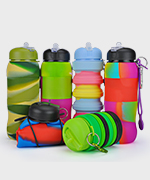WHY CHOOSE SILICONE INSTEAD OF PLASTIC?
What About BPA-free Plastic?
The long and short of it was clear: plastics are petroleum-based products and manufacturers add chemicals (like BPA and similar) to create various functionalities. For the squeezy plastics, phthalates are often added. The rigid plastics typically contain the BPA. The plastics manufacturers aren’t forthcoming about what chemicals they add and it’s hard to test for chemicals unless you know which chemical or mineral you are looking for.
Testing plastics is kind of a cat and mouse game. For example, now that consumers are demanding BPA-free plastics, and some regulations are in place requiring plastics be BPA-free in the USA, Canada and Europe, there’s a wave of BPA-free labeling going on. In the place of BPA, however, manufacturers have sought out alternate chemicals to achieve the functionality they need in their plastic materials. One of these chemicals, which scientists are find is even more toxic than BPA, is called bisphenol-S (BPS).
Why Choose Silicone Instead of Plastic?
Silicone is indisputably safer for human health than plastic, which is a petroleum-based material commonly containing estrogen-mimicking chemicals like bisphenol-A (BPA). Furthermore, when it comes to the environment, silicone is highly durable and more environmentally friendly than plastic.
Silicone is much longer lasting than plastic and endures extreme fluctuations in temperatures – from very cold to oven hot – without melting, cracking or otherwise degrading. Reusable plastic containers may last a year or a few years if they are hand washed, but they end up getting scratched, foggy, broken and needing to be retired from use much sooner than similar items made from silicone.
Silicone resists oxidative deterioration (normal aging) for decades on end. In fact, studies have shown that silicones thrive on challenges, including exposure to extreme heat and cold, harsh chemicals, sterilization, rain, snow, salt spray, ultraviolet radiation, ozone and acid rain, to name a few. If disposed of at a landfill for incineration, the silicone (unlike plastic) is converted back into inorganic, harmless ingredients: amorphous silica, carbon dioxide and water vapor.
Reducing Dependency on Plastic
With more than 5 trillion pieces of plastic floating in our oceans, using less plastic by turning to steel and silicone alternatives means contributing less to this mounting mass of plastics lost in our environment and poisoning our wildlife. For these reasons, I believe based on my research that while better materials may become available in the future, silicone is now the best choice for families who are seeking to reduce their dependence on plastics.








